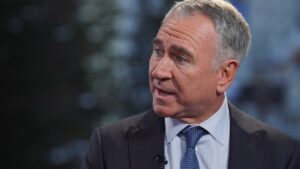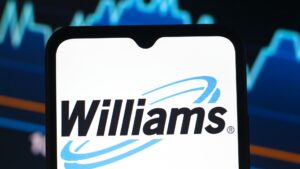All investment carries risk, even for those just wanting to generate passive income rather than scorching profits from their portfolios. But there are some UK stocks that might just offer a smoother ride than most over the long term.
National Grid
National Grid (LSE: NG) is as a good example of a company I’d buy if my tolerance for risk was on the lower side.
The power provider has long been a favourite among dividend hunters and for good reason. We rely on the Grid to manage the electricity and distribution networks in the UK. This makes it about as defensive as they come and helps to explain why it’s built up a stellar record when it comes to hiking payouts every year.
Having said this, dividends per share are expected to be 20% lower in 2024 than in 2023 as a result of the company needing to raise cash to decarbonise the UK’s energy grid over the next five years. It’s a lesson that nothing can be guaranteed.
I don’t think shareholders should be too disheartened. If all goes to plan, having a green energy focus could prove very profitable, supporting dividend increases in the future. This is assuming National Grid’s sizeable debt pile remains manageable.
The forecast yield currently stands at 4.7% too. That’s still above the average across the FTSE 100.
Unilever
Another stock I’d consider buying would be consumer goods behemoth Unilever (LSE: ULVR)
The owner of brands such as Domestos, Lynx and Marmite currently yields 3%. That’s a lot less that some top-tier members. However, I’d rather own stakes in companies that had proven themselves to be reliable dividend distributors at the expense of lower but more realistic payments.
One of the reasons Unilever has great income credentials is that it sells branded products people usually buy out of habit. I say ‘usually’ because the cost-of-living crisis has pushed many of us to switch to cheaper alternatives. The danger is that at least some shoppers won’t go back.
But I’m optimistic. Consumers tend to have fairly short memories. And even if purse strings remain tight, Unilever’s items are relatively low ticket. It’s those businesses selling luxury products that might be hit hardest.
This should mean the dividends keep rising in most years and flowing out to investors.
GSK
A third passive income stock offering less risk than most, at least in my opinion, is pharmaceutical giant GSK (LSE: GSK).
My rationale on this is simple. As a provider of vaccines, speciality medicines and general medicine, GSK is there to pick up the pieces when illness strikes. And that’s something we’ll all experience from time to time.
GSK is expected to distribute 60.2p per share in income in 2024. This translates to a yield of 3.6%. Go back a couple of years and it was 100p. Why the drop?
Well, this was the time before GSK spun off its consumer division. Now that it has happened, it can start growing its payouts again (which had been maintained for years before the break-up). Then again, this will depend greatly on the company bringing new drugs to market. And that’s an expensive process.
At least the shares look dirt cheap. A price-to-earnings (P/E) ratio of 10 for the stock is below the long-term average across the FTSE 100.
This post was originally published on Motley Fool







